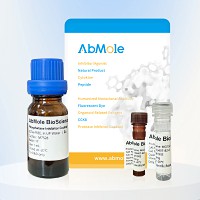All AbMole products are for research use only, cannot be used for human consumption.

Species: Human/Cynomolgus
Expression system: Mammalian
Molecular weight: 16.7 KDa
Purity: > 95% as determined by reduced SDS-PAGE
Endotoxin: LAL test less than 0.1 ng/µg (1 EU/µg)
Storage and stability: The freeze-dried protein should be stored at ≤-20℃ and stored stably for one year after receiving. The recombinant protein solution can be stored at 2-8℃ for 2-7 days. The recombinant samples were stable for 3 months at ≤-20°C.
Bioactivity: t cell-specific surface glycoprotein CD28(CD28) is a single-channel membrane protein containing an IGg-like EV-like (immunoglobulin-like) domain. It belongs to the immunoglobulin (Ig) superfamily. CD28 is a molecule expressed on T cells that provides a costimulatory signal needed for T cell activation. CD28 co-stimulation is necessary for CD4-positive t cell proliferation and survival, interleukin-2 production, and T-helper type 2 development. Human thymus retroregulatory T cells require CD28 co-stimulation in order to expand and maintain effective inhibitory function in vivo. Apoptosis plays a key role in age-related decline in CD28 expression and immunosenescence. CD28 is a receptor for CD80 (B7.1) and CD86 (B7.2). CD80 is upregulated in antigen-presenting cells (APCs) when activated by toll-like receptor ligands. The expression of CD86 on antigen presenting cells is constitutive. CD28 is the only B7 receptor that is constitutively expressed on naive T cells.
| Solubility (25°C) | It is not recommended to reconstitute to a concentration less than 100μg/ml. |
| Storage |
Powder -20°C 3 years ; 4°C 2 years In solvent -80°C 6 months ; -20°C 1 month |
| Related Cytokines and Growth Factors Products |
|---|
| Recombinant Human GDF-15 Protein (HEK293 N-hFc)
Growth-differentiation factor 15 (GDF15), also known as MIC-1, is a secreted member of the transforming growth factor (TGF)-β superfamily. GDF-15 has a role in regulating inflammatory and apoptotic pathways in injured tissues and during disease processes. GDF-15 overexpression arising from an expanded erythroid compartment contributes to iron overload in thalassemia syndromes by inhibiting hepcidin expression. |
| Recombinant Human FGFR1 Protein (HEK293, C-His)
FGFR1, also known as CD331, is a full-length representative protein consists of an extracellular region, composed of three immunoglobulin-like domains, a single hydrophobic membrane-spanning segment and a cytoplasmic tyrosine kinase domain. |
| Recombinant Human FGFR2 Protein (HEK293, C-His)
FGFR2, also known as CD332, acts as cell-surface receptor for fibroblast growth factors and plays an essential role in the regulation of cell proliferation, differentiation, migration and apoptosis, and in the regulation of embryonic development. FGFR2 plays an essential role in the regulation of osteoblast differentiation, proliferation and apoptosis, and is required for normal skeleton development. It also promotes cell proliferation in keratinocytes and imature osteoblasts, but promotes apoptosis in differentiated osteoblasts. |
| Recombinant Mouse BMP-4 Protein (E. coli, C-His)
Bone Morphogenetic Protein-4 (BMP-4) is a critical signaling molecule required for the early differentiation of the embryo and establishing of a dorsal-ventral axis. BMP-4 is secreted from the dorsal portion of the notochord, and it acts in concert with sonic hedgehog to establish a dorsal-ventral axis for the differentiation of later structures. |
| Recombinant Human Coagulation Factor X (HEK293, C-Fc)
Coagulation factor X, belongs to the peptidase S1 family. Coagulation factor X is initially synthesized in the liver. Coagulation factor X is a vitamin K-dependent glycoprotein that converts prothrombin to thrombin in the presence of factor Va, calcium and phospholipid during blood clotting. |
All AbMole products are for research use only, cannot be used for human consumption or veterinary use. We do not provide products or services to individuals. Please comply with the intended use and do not use AbMole products for any other purpose.


Products are for research use only. Not for human use. We do not sell to patients.
© Copyright 2010-2024 AbMole BioScience. All Rights Reserved.
